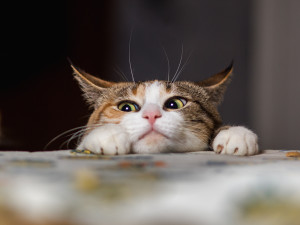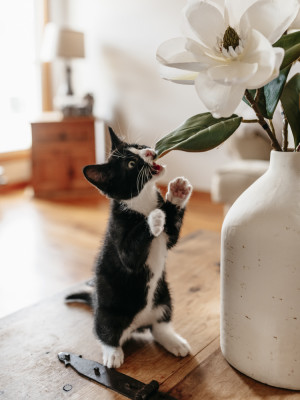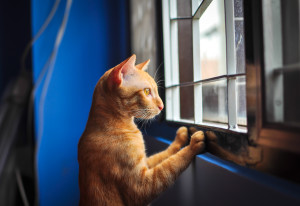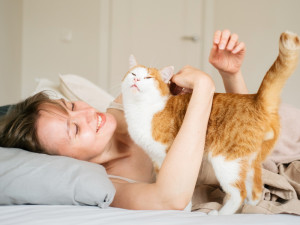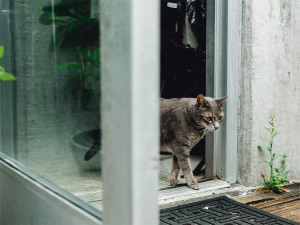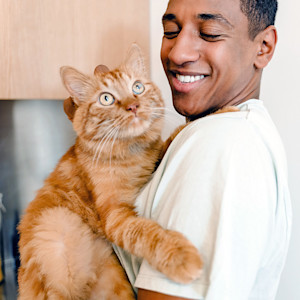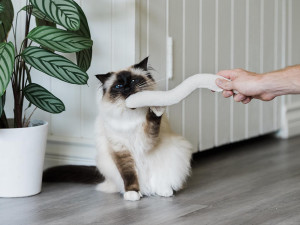Why Does Your Cat Like the Window Open?
A little breeze is nice. Just make sure that screen is sturdy.

Share Article
In This Article:
Do Cats Get Bored? Reasons Cats Love Open Windows How To Keep Your Window Secure and Comfortable for Your Cat
An open window can open a whole new world for your cat. Think about their keen sense of sight and smell, their fascination with movement, the way a bird or bug can spark their prey drive. Is it any wonder they love to sit in windows, smelling the smells, watching the sights, and enjoying all that mental stimulation?
Do cats get bored?
Yes! Emphatically yes! Just in case you missed it… yes! Cats can absolutely get bored. In fact, I’d wager that most cats are bored a lot of the time. Think about a wild cat’s life outdoors. They aren’t lying around, sleeping all day. They roam, investigating the different scents they find along the way.
They’ll take lots of hunting breaks. Cats can kill as many as twenty prey in a day. That means they’re probably going after twice that many. There are trees to climb, bugs to torture, and gardens to poop in. Cats are designed to lead active, engaged lives, using all of their amazing senses.

One of the most impactful things you can do for your house cat is to provide lots of play and mental enrichment. It’s incredible the difference it can make — from managing unwanted behavior (like knocking things off shelves), to calming play aggression, reducing stress, building confidence, and more.
Reasons cats love open windows
Let’s break down some of the reasons your cat enjoys an open window.
Bird watching
Why limit it to birds? Let’s call it critter watching. Cats hunt birds, insects, snakes, lizards, and rodents. If something outside the window sparks that prey drive, your cat will lock in for a seriously intense staring session. It’s fun to watch anything that moves, prey or not, including grass swaying in the breeze or a leaf falling from a tree.
Curtains or blinds
If there’s a breeze, the curtains or blinds may move a little, which can be enticing to cats. They also make a good hiding spot. You may have noticed your cat will spot a critter and quickly dash behind something, hoping to become invisible, so they can better stalk their prey. Curtains and blinds are perfect for this.
Fresh air and a breeze
Who doesn’t love a breeze? I know you’ve had that moment when the air hits your face and you think, Whoa! What is that delicious smell coming from next door? I need that for dinner!
Think about your cat’s sense of smell. It’s thought to be fourteen times stronger than yours — able to smell a meal from a football field’s length away, if not more. They must be picking up so many interesting scents in the air. That’s great mental stimulation.
Bugs to swat at
Let’s face it: Bugs are like an amusement park ride to a cat. They will have so much fun poking, smacking, sniffing, and doing other admittedly awful things to that bug. Insects inside tend to gravitate toward windows. Insects outside often buzz around open windows and climb the screen, making for perfect target practice.
Rain and condensation
Anything that moves can be interesting to your cat, including water dripping or streaming down the window or screen. They may sit at the open or closed window watching and pawing at the drips. They may even lick the water from the window (which is why it’s important to use cat-safe cleaning products).
Standing guard
Cats can get very tense, fearful, and even aggressive when another cat comes into their sightline. That cat’s scent could be coming in on the breeze. Just a quick sighting or smell of a stranger cat could cause your cat to set up a watchpost at the window.
This is actually a huge trigger for things like spraying and redirected aggression. It can be a real problem for your cat and the people in your home.
People-watching
Your cat may be watching people pass by or you working in the yard. When it comes to the latter, they may enjoy interacting with you through the window or hope that if they make enough of those innocent baby “mews” you’ll give in and let them come outside.
Rodent-watching
My cat sits at the window every night, starting around 9 p.m., watching for one tiny mouse that runs the same route across my patio, over and over, as he takes food back to his den. It only took one sighting for my cat to make this part of his nightly routine.
Watching for you to come home
If your cat gets excited when you come home, or if coming home means they get fed (duh), they may enjoy sitting at the window watching for you. Or the sound of activity outside, as you arrive, may pique their interest.
How to keep your window secure and comfortable for your cat
These are just some reasons your cat may love sitting at the open window. You can make it easily accessible and cozy by adding beds, window perches, a cat-specific heating or cooling mat, and even steps for older or mobility-challenged kitties to get up there safely. But here’s a huge word of warning: A basic window screen isn’t going to keep your cat in.
If a cat’s prey drive is triggered, they may lunge at prey without even realizing there’s a screen or drop-off outside the window. Last summer, I heard a huge ruckus, ran into the room, and found my cat stunned on the patio, seemingly unsure of how he got there, and the screen door five feet away. He lunged at a bird and found himself suddenly outside having knocked the screen door off its track.
Cats jumping or falling out of windows is so commonplace that there’s a name for it: High-Rise Syndrome. I recently had a client whose cat jumped out a four-story window when the neighbor’s dog ran into their home and scared the cat.
You must take precautions, especially if your cat isn’t allowed outside or you live above the first floor.
Secure your screens. You can use heavier, stronger materials and screw the screens into the window frame. You might only do this on select windows, so your screens in other windows are easily removed in case of emergency.
Use cat-safe screen material. This is a special screen mesh that provides more protection against cat claw damage or climbing. But it doesn’t keep the screen in the window. You still need reinforcement.
Use a window security gate. Much like a pet gate that you’d attach to a doorway, or security bars, you can get models that attach inside the window and can be removed easily. But watch out for possible dangers, like bars wide enough that your cat could get stuck. You can add screen over the bars for extra safety.
Do an online search for window baby-proofing and window security screens. Many of the same products work for cat-proofing. Just make sure your cat can’t climb or squeeze through the protective device. It has to be safe for them.
If you take some safety precautions, your cat can safely enjoy all the wonderful things about sitting in an open window.
Bottom line
There’s a ton of mental stimulation for cats enjoying an open window, which is beneficial for their overall quality of life.
Open windows can be extremely dangerous for cats, even if they have screens.
It’s vitally important to make sure your window screens are secure, or you’ve added other forms of protection, so your cat can’t jump or fall out of the open window.
References
“Feline Behavior Problems: Destructive Behavior.” Cornell University College of Veterinary Medicine, 9 Oct. 2017, www.vet.cornell.edu/departments-centers-and-institutes/cornell-feline-health-center/health-information/feline-health-topics/feline-behavior-problems-destructive-behavioropens in new tab.
Herron, Meghan E, and Tony Buffington. “Environmental Enrichment for Indoor Cats.” Compendium (Yardley, PA), vol. 32, no. 12, Dec. 2010, p. E4, pmc.ncbi.nlm.nih.gov/articles/PMC3922041/opens in new tab.
“Keeping Kitty Content: Tips and Tricks for Identifying and Minimizing Stress in Your Cat Population | Gimme Shelter, MSMP Blog and News.” Cornell.edu, 30 May 2018, blogs.cornell.edu/cornellsheltermedicine/2018/05/30/keeping-kitty-content-tips-and-tricks-for-identifying-and-minimizing-stress-in-your-cat-population/opens in new tab. Accessed 12 Mar. 2025.
“Keeping Your Indoor Cat Happy | Orange County, NC.” Www.orangecountync.gov, www.orangecountync.gov/1332/Keeping-your-indoor-cat-happyopens in new tab.
Scandurra, Anna, et al. “Home Sweet Home: The Impact of Lifestyle on a Cat’s Approach to Impossible Tasks in the Home Environment.” Animals, vol. 13, no. 16, 1 Jan. 2023, p. 2679, www.mdpi.com/2076-2615/13/16/2679#B1-animals-13-02679opens in new tab, https://doi.org/10.3390/ani13162679opens in new tab.
“Every Cat Needs Some Entertainment.” VMBS News, 20 Apr. 2017, vetmed.tamu.edu/news/pet-talk/every-cat-needs-some-entertainment/opens in new tab. Accessed 12 Mar. 2025.

LeeAnna Buis, CFTBS, FFCP
LeeAnna Buis has adored cats her entire life and thought she knew them inside out and sideways. But it wasn’t until she worked with a feline behavior consultant that she fully understood how incredible, complicated, and inspiring they really are. She made a career change, starting the certification process to become a behavior consultant right away. She discovered what unique, fascinating, complex creatures cats are and knew this was what she wanted to do with her life — help others on a similar journey to truly knowing, loving, and appreciating their cats.
LeeAnna earned her certification through Animal Behavior Institute, where she received the certified feline training and behavior specialist (CFTBS) designation.
Related articles
![orange cat looking out window]()
Is Your Cat’s Separation Anxiety Ruining Their Life and Yours?
Why your cat freaks out when you’re away (and how to help).
![Woman laying on her bed while hugging her cat]()
Why Does My Cat Wake Me Up at the Crack of Dawn?
A cat pawing at your face at 4 a.m. is hard to ignore, but cat behaviorist Cristin Tamburo suggests you try.
![Gray and white cat walking out the door]()
Preventing Escape Artists: How to Keep Your Cat from Running Away
Your kitty’s an explorer. Just keep their expeditions indoors.
Why Does My Cat Scratch the Wall?
Well, that is a little unsettling.
![Man holding his large orange cat in his arms.]()
How to Reinforce the Bond With Your Cat
A behaviorist’s advice.
![A fluffy Siamese cat sitting on the wooden floor playing with a the Snake Cat Toy from Boba and Vespa next to a striped Calathea plant]()
7 Cat Kicker Toys That Will Help Your Cat Beat Their Boredom
The cat kicker toys that will keep your cat booked and busy (and kicking like they’re Megan Rapinoe).
